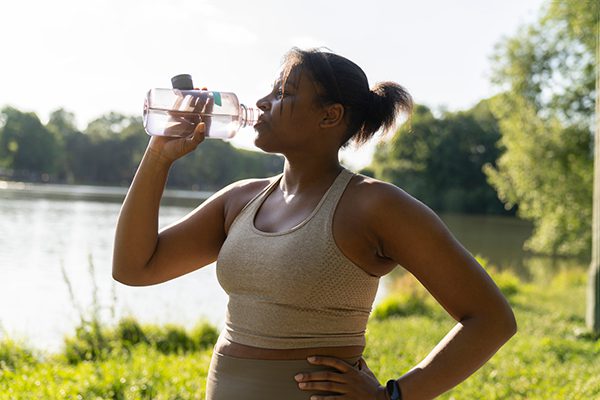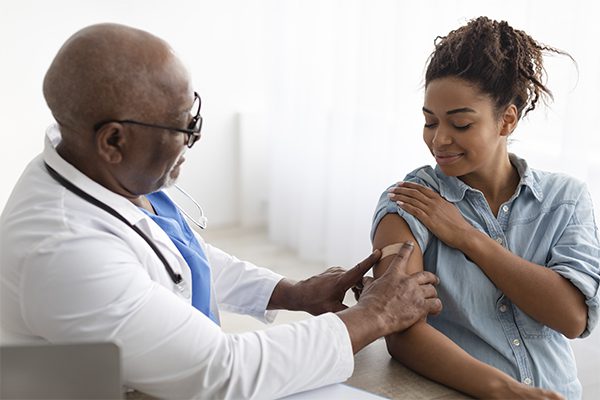Care Beyond The Walls®
UV Safety: Soaking up the Sun Protection
Summer is here and so is the sunshine! As we move into the months full of beach vacations, yard work, and barbeques, our exposure to the sun increases significantly. When taking care of our physical health, it’s crucial to protect our skin against the sun and harmful UV rays. It’s important to know how to keep yourself safe from the sun and maintain skin health for a healthy life. Check out our helpful information on UV safety and our tips to looking after your skin so you can stay safe all summer long.
Understanding UV radiation
It’s important to protect ourselves from UV (ultraviolet) rays all year. While both UVA and UVB rays can impact health, UVA penetrates the skin deeper, and we are exposed to it more often throughout the year. Even on a cloudy or cool day, UV rays can reflect off surfaces like snow and water.
It is estimated that 90% of nonmelanoma skin cancers are related to UV radiation exposure from the sun.
Those most vulnerable
While everyone can experience the harmful health effects of UV radiation, some people are more susceptible. This includes those who:
- are over 50 years old.
- spend a lot of time in the sun.
- have light colored eyes, skin, and/or hair.
- have a family member who has had skin cancer.
- take certain birth control pills or antibiotics.
- use acne treatment products that contain benzoyl peroxide.
Tips to protect against UV radiation
- Wear a broad-spectrum sunscreen with an SPF 15 or higher and reapply every 2 hours when in the sun and after sweating or swimming.
- Wear a hat with a brim to protect the top of the head, face, eyes, ears, and the back of the neck. Avoid hats with holes, like straw hats.
- Wear sunglasses that block both UVA and UVB rays. They should have a UV 400 rating or say “100% UV protection.”
- Find shaded areas like under an umbrella or tree.
- Limit time in the sun when rays are strongest, typically between 10:00 am – 4:00 pm.
- Wear long clothing or clothing that offers certified UV protection.
- Avoid tanning beds and sun tanning.
- Pay attention to the UV index. If it’s 3 or higher, take precautions to protect skin.
What is SPF?
SPF stands for Sun Protection Factor and is a measure of the amount of UV radiation needed to get a sunburn when the skin is protected. As a sunscreen’s SPF increases, the amount of protection against sunburn also increases. It’s important to remember that SPF is not related to the length of sun exposure but rather the amount of sun exposure.
- For example, you may be exposed to the same amount of UV radiation by spending 1 hour outside at 8:00am as you are by spending 20 minutes outside at 2:00pm.
Routine skin checks
Annual skin checks by your provider can help detect early signs of skin cancer. But monthly self-skin checks are important for those who are at higher risk of skin cancer.
When detected early, the 5-year survival rate for melanoma is 99%.
For a self-skin check, all you need is a well-lit room with a full length and hand-held mirror or a spouse, partner, or other trusted person.
Carefully examine the entire surface of the body, even the hard to see places like the underarms, behind the knees, and bottoms of feet. When looking at your hands and feet make sure to look between your fingers and toes. A comb may be needed to part hair to check the scalp.
Pay attention to your skin
During a self-skin check look for:
- A mole or spot that is new or has changed size, shape, or color
- A mole or spot with an irregular shape or border or has areas with different colors
- Rough, scaly red patches
- Sores that are slow to heal or bleeding
- Wart-like growths
Always have your skin checked by a provider if you see something concerning.
Keeping you safe from the sun
Schedule an annual skin check with your provider today!
Sources
https://www.cdc.gov/nceh/features/uv-radiation-safety/index.html
https://www.cdc.gov/cancer/skin/basic_info/sun-safety.htm
https://www.cancer.org/cancer/risk-prevention/sun-and-uv/uv-protection.html
https://www.who.int/news-room/questions-and-answers/item/radiation-the-ultraviolet-(uv)-index
https://www.fda.gov/about-fda/center-drug-evaluation-and-research-cder/sun-protection-factor-spf
https://www.cancer.org/cancer/risk-prevention/sun-and-uv/skin-exams.html
https://www.fda.gov/consumers/consumer-updates/tips-stay-safe-sun-sunscreen-sunglasses
Sign up to get the latest news and insights from Proactive MD.


